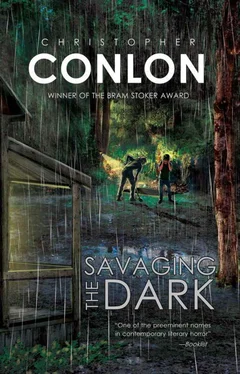Christopher Conlon - Savaging the Dark
Здесь есть возможность читать онлайн «Christopher Conlon - Savaging the Dark» весь текст электронной книги совершенно бесплатно (целиком полную версию без сокращений). В некоторых случаях можно слушать аудио, скачать через торрент в формате fb2 и присутствует краткое содержание. Город: New York, Год выпуска: 2014, ISBN: 2014, Издательство: Evil Jester Press, Жанр: Триллер, Ужасы и Мистика, на английском языке. Описание произведения, (предисловие) а так же отзывы посетителей доступны на портале библиотеки ЛибКат.
- Название:Savaging the Dark
- Автор:
- Издательство:Evil Jester Press
- Жанр:
- Год:2014
- Город:New York
- ISBN:978-0-615-93677-2
- Рейтинг книги:4 / 5. Голосов: 1
-
Избранное:Добавить в избранное
- Отзывы:
-
Ваша оценка:
- 80
- 1
- 2
- 3
- 4
- 5
Savaging the Dark: краткое содержание, описание и аннотация
Предлагаем к чтению аннотацию, описание, краткое содержание или предисловие (зависит от того, что написал сам автор книги «Savaging the Dark»). Если вы не нашли необходимую информацию о книге — напишите в комментариях, мы постараемся отыскать её.
Her lover’s name is Connor. He’s got blonde hair, green eyes… and he’s eleven years old.
Savaging the Dark — читать онлайн бесплатно полную книгу (весь текст) целиком
Ниже представлен текст книги, разбитый по страницам. Система сохранения места последней прочитанной страницы, позволяет с удобством читать онлайн бесплатно книгу «Savaging the Dark», без необходимости каждый раз заново искать на чём Вы остановились. Поставьте закладку, и сможете в любой момент перейти на страницу, на которой закончили чтение.
Интервал:
Закладка:
But none of this activity pushes Connor Blue from my mind for more than a few minutes at a time. When I dress for school in the morning I find myself wondering, even as Bill kisses me goodbye, even as Gracie runs around, what Connor will think of this pink top, how many buttons I can get away with leaving undone, whether he likes me better in pants or skirt, if I can wear the black heels or if they’re too close to fuck-me pumps and then I shake my head violently and clear my mind of all such thoughts, toss what I’d begun to put on to the closet floor and go with the simplest, plainest professional clothes I have: long-sleeved white blouse buttoned high, tan skirt reaching almost to my ankles, plain brown flats. The woman staring back at me in the mirror looks like exactly what she is: a schoolteacher. Neither attractive nor unattractive. One of the invisible people of the world.
At school I find myself sometimes growing short with Connor, deliberately not calling on him when he raises his hand in class, dismissing his answers brusquely when I do. I abruptly cancel some of our lunch hours, claiming I have meetings. I all but ignore him in the after-hours tutoring sessions with the other students. He begins to look at me in a hurt way, his eyes darkening, his face tense with unhappiness. Or so I imagine. It’s possible he doesn’t care at all. But I think he does. I think it when his hand is up enthusiastically in class and we make eye contact and I turn away and call on another student, watch him in the corner of my vision and see his perplexed expression. He cares. I know he does. I think I know.
But I can’t keep it up, any more than I can keep up my new enhanced perfect-mother perfect-wife perfect-teacher routine. One by one my new resolutions to do better fall away. I return to passiveness regarding Lauren and Richard and Kylie. I stop spending so much time with Gracie. At night I turn away from Bill, plead headache, tiredness, cramps. I return to myself. But I’m not there, not anymore.
10
When winter comes it comes ferociously, an early December storm hurling down a foot and a half of snow with near-blizzard winds blowing it around into whiteout conditions. School closes for days. Bill still goes to work, so I’m left alone in the house with Gracie watching videocassettes of Pocahontas and The Lion King and Babe, each for what feels like the twentieth time. Our power flickers, goes black now and then, lurches on again. The cable TV turns to static. I’m overcome with a sense of dread, a sensation that I’m entering a darkness from which I’ll never rise again. I play with Gracie, let her “help” me make cookies and dinner, but I find a strange lassitude in myself regarding her. It’s as if she’s someone else’s child, not mine at all. I’m soaking in the bathtub one afternoon, sweat pouring from me, my skin red and tender, when there is some kind of explosion that seems to rock the house. Gracie runs in panicked, I wrap a towel around myself, hold her hand as we look out the front window and see that a huge snow-heavy branch from the neighbor’s white oak tree has crashed down on my car, crumpling the hood, cracking the windshield. Immediately it feels like judgment, a judgment on me, a sentence carried out on the guilty. Or at least a warning. I stare at the snow falling for a long time, stare at my broken car. Finally Gracie pushes something soft and warm into my hand, saying, “Mommy? Your towel fell off, Mommy. You shouldn’t be naked in the window.”
The storm finally passes, school reopens, life resumes. The car gets fixed. But when I arrive in my classroom that first day back it feels as if something has changed in me, some inner lens has undergone a permanent and profound refocusing. I realize that I’ve been lonely over this past week of snow days. I’ve felt adrift, lost. And yet when I look at Connor Blue come into the room for fourth period, enthusing to one of the other boys about the fun he’d had sledding yesterday, I know I’ve found myself again. I watch him make his way to his desk, drop himself down. His hair is askew, his cheeks flushed. He’s talking about going sledding with another boy, Douglas Peterson, a good development—he needs to socialize more with boys his age, I know. But then I realize that what they’re talking about is checking out a couple of the school sleds and doing it during lunch period today. My heart seems to drop into my stomach. I’ve not seen Connor in over a week and he wants to go sledding with his new friend rather than spend the time in this room with me? Suddenly everything seems to go gray in my vision, I feel my knees buckle. But I don’t faint. I shake my head, right myself, welcome the students—“Hi Lauren, Hi Richard, Hi Kylie, Hi Douglas, Hi Connor”—and ask them about their snow day adventures before beginning the lesson. Stories of snowmen, snowball fights. Connor raises his hand and talks about sledding down the big hill near his house, his eyes bright and excited in meeting mine. Does he know how this hurts me? Is that why he’s doing it? I don’t want to believe it of him. But part of me suspects.
At the end of the period, as he gathers up his things and confers with Douglas about getting sleds, I say coolly, “Connor, may I speak to you for a moment?”
He glances up, seemingly unconcerned. “Huh? Oh, sure, Ms. Straw.” To Douglas: “I’ll catch up with you. Get two, okay?” The boy leaves, they all leave. In a minute it’s just Conner and me alone in the room. He walks up boldly to where I sit at my desk. “What’s up, Ms. Straw?”
But I suddenly realize that I have no idea what I want to say to him.
“Are—are you and Douglas friends now?” I ask in a small voice. I seem to be having trouble breathing.
“Huh?”
“You. And Douglas. Are you friends?”
He cocks his head. “I dunno. I guess we are.”
“That’s—that’s good.” I stare at his white sweater, at his soft young hands. His blue jeans are faded and frayed. I should buy him new ones, I think, and instantly dismiss the notion, tell myself I didn’t think that at all.
“I guess.” He looks puzzled. “Did you want something, Ms. Straw?”
“No, I…” It occurs to me then. “Connor, would you like to make some money?”
“How?”
“Are you good at shoveling snow?”
“Pretty good. I shoveled the front walk at our house yesterday.”
The thoughts suddenly tumble into place, onto after another, dominoes falling.
“We have a back path,” I say, “that leads to our storage shed. My husband hasn’t gotten around to shoveling it. Would you?”
“Well, sure, I guess. But I don’t know where you live.”
I tell him. I don’t tell him that I’ve looked in the file at the main office, learned where he and his father reside. It’s in a different housing tract, a poorer one, but not more than a mile from us and on a main bus route. We talk about price for a moment.
“And you could use our snow shovel,” I say.
“Okay.” He smiles. “When?”
“How about tomorrow?” I say. “Friday. Could you make it on Friday afternoon? Should I call your father about it?”
“Nah, he’ll be at work anyway. He won’t care.”
“Four o’clock?”
“Sure. Okay. I’ll be there.” He looks distractedly toward the classroom window. “Can I go now?”
I smile and stand. “Of course, Connor. Thank you.”
He grins and runs for the door, stopping to pull on his old brown coat before scampering out onto Cutts School’s gentle hills, green in spring, smooth and white now. I walk to the window where I can see him and Douglas pulling red sleds up the steepest hill on the property, which isn’t very steep, really. Still, they ascend the hill, mount their sleds, slide down. I can hear their little boy cheers as they drop. My body tingles. Sweat trickles down my neck. Looking down at my hands I realize that they’re quivering. Yet I’ve done nothing wrong, I know. I have done nothing wrong. This is a perfectly pedestrian arrangement between a teacher and her student, and what I told him was absolutely true. There is a back path to our storage shed where we keep our firewood, among other things. Bill has failed to clear it yet. What’s more, I know Connor has no money. The few dollars I’ll pay him for this service will be a godsend to him, allowing him to buy any number of things. Comic books. French fries at McDonald’s. Admission to a movie downtown. Perhaps the back path doesn’t really need to be shoveled with any urgency—we have plenty of firewood in the house anyway—but this kind of make-work project just shows once again how caring I am as a teacher. He’s a poor boy. I’ve found an excuse to let him earn some money. No one could possibly criticize, no one could judge.
Читать дальшеИнтервал:
Закладка:
Похожие книги на «Savaging the Dark»
Представляем Вашему вниманию похожие книги на «Savaging the Dark» списком для выбора. Мы отобрали схожую по названию и смыслу литературу в надежде предоставить читателям больше вариантов отыскать новые, интересные, ещё непрочитанные произведения.
Обсуждение, отзывы о книге «Savaging the Dark» и просто собственные мнения читателей. Оставьте ваши комментарии, напишите, что Вы думаете о произведении, его смысле или главных героях. Укажите что конкретно понравилось, а что нет, и почему Вы так считаете.












